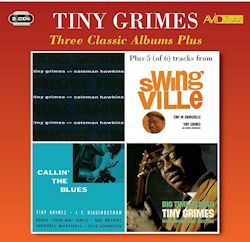CD1
Blues Groove
1. Marchin' Along
2. A Smooth One
3. Blues Wail
4. April In Paris
5. Soul Station
Tiny In Swingville
6. Homesick
7. Frankie And Johnnie
8. Down With It
9. Ain't Misbehavin'
10. Durn Tootin
CD2
Callin' The Blues
1. Callin' The Blues
2. Blue Tiny
3. Grimes' Times
4. Air Mail Special
Big Time Guitar
5. Do It Yourself Blues
6. Happiness Is Just A Thing Called Joe
7. Work Song
8. Lullaby Of The Leaves
9. I'm Beginning To See The Light
10. Blue Morocco
11. I'm Getting Sentimental Over You
12. Satin Doll
13. Dreamy
14. Red Rooster Ruckus
15. Coffee Break (Big Time Guitar)
Blues Groove
– Coleman Hawkins (tenor sax): Musa Kaleem (flute): Ray Bryant (piano): Tiny Grimes (guitar): Earl Womack (bass): Teagle Fleming (drums), recorded 1958
Tiny in Swingville
– Tiny Grimes (guitar): Jerome Richardson (tenor and baritone saxes, flute): Ray Bryant (piano): Wendell Marshall (bass): Arthur Taylor (drums) recorded
1959
Callin’ the Blues
- Tiny Grimes (guitar): J.C. Higginbotham (trombone): Eddie ‘Lockjaw’ Davis (tenor sax): Ray Bryant (piano): Wendell Marshall (bass): Osie Johnson (drums),
recorded 1958
Big Time Guitar
- Tiny Grimes (guitar): Ed Swanston, L.S Williams (organ): Kelly Martin, E Crawford (drums), recorded 1962
These four Prestige albums were made between 1958 and 1962 and chart an erratic progress. Guitarist Tiny Grimes had worked before the War in a trio with
Art Tatum and Slam Stewart and by the 40s was active on 52nd Street before achieving a degree of local fame (and retrospective notoriety) for
his Rocking Highlanders in which band he sported many a kilter and tam-o-shanter. In one respect at least he was a staunch traditionalist, spurning six
strings in favour of four.
Blues Groove
teams him with Coleman Hawkins, little-remembered flautist Musa Kaleem and a rhythm section anchored by the ever-dependable Ray Bryant. There are five
tracks of which Marchin’ Along lasts fully 17-minutes, an extended Blues shuffle with Hawk cooking nicely and Bryant evincing down home
credentials. Kaleem’s husky-toned playing is heard at its best on Benny Goodman’s A Smooth One though generally this is a bit of an all-purpose
date, largely undemanding, replete with some undesired quotations in solos, and altogether too diffuse and riffy for real satisfaction.
One cut had to be excised from the next Prestige album, Tiny in Swingville, which paired him with Jerome Richardson. If you have a yen to hear
that old fireside favourite Annie Laurie, then you’ll want to seek it elsewhere, though doubtless the Highlanders had done it to death in years
gone by. Richardson’s dark, dank soulful baritone is his most distinctive instrument, though his tenor playing is fine and his flute playing makes a marked
contrast to that of Kaleem on the earlier date. The repertoire is standard, the routines dependable and solos thoroughly efficient. A look at the rhythm
section will show you that this was a solid ensemble.
I’d not heard Callin’ the Blues before, the 1958 date that teamed Grimes with a personal favourite of mine, trombonist J C Higginbotham, as well
as Lockjaw Davis. Once again Grimes had his first class rhythm section with him – Bryant, Wendell Marshall and Osie Johnson. Higginbotham marries
done-to-death blues clichés with his more inventive phraseology, wrong-footing expectations, whilst Lockjaw adds grit to the rather back-beat date. In
fact, despite the guitarist-leader’s presence it’s a case of thank God for Lockjaw as his no-nonsense straight-ahead rawness is a perfect foil to the
craggy humour of Higgy and the rather-too-complacent guitar stylings of Grimes.
The last album is a real dog’s dinner. Teaming Grimes with a cathedral of organists and a two-drummer team was only ever going to end one way. The sound
throughout is crude, the ethos straight-ahead swingers and rockers. This 11-track gumbo doesn’t really do itself justice though there is a deft
interpretation of Erroll Garner’s ballad Dreamy and one can hear echoes of Grimes’ admiration for Charlie Christian in I’m Getting Sentimental.
The impression here is of a man working within his stylistic and technical limitations to produce a variety of largely good-time music. Nothing too
demanding. Nice layout and presentation from Avid.
Jonathan Woolf
